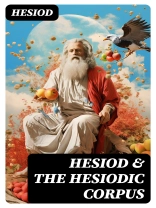In ‘Hesiod & The Hesiodic Corpus, ‘ the ancient Greek poet Hesiod presents a profound exploration of mythology, ethics, and the human condition through his didactic and narrative verse. This work serves as a foundational text in the study of early Greek literature, encapsulating the tension between humanity and the divine, the moral implications of labor, and the interplay of fate and free will. Hesiod’s unique style combines conventional epic storytelling with an infusion of personal voice, establishing a nuanced approach to themes such as justice, labor, and the nature of the gods, which resonates within the broader context of the epic tradition and pre-Socratic philosophy. Hesiod, believed to have lived around the 8th century BCE, is often considered a contemporary of Homer, yet his works, including ‘Theogony’ and ‘Works and Days, ‘ delineate a different perspective on the cosmos and human existence. Drawing from his own experiences as a farmer, Hesiod reflects on his socio-economic context, revealing insights into ancient Greek rural life and the ethical dilemmas faced by everyday people, an angle often eclipsed by the more grandiose narratives of his epic counterparts. This seminal collection is recommended to readers seeking a deeper understanding of early Greek literature and its cultural milieu. Hesiod’s rich tapestry of mythological motifs combined with practical wisdom offers invaluable insights that continue to resonate with contemporary themes of justice, work, and divine interaction, making it essential reading for anyone interested in the foundations of Western thought and literature.
Tentang Penulis
Hesiod stands among the earliest Greek poets, whose works are key sources for our understanding of Greek mythology, farming practices, and ancient time-keeping. Active around the 7th century BCE, he is often considered a contemporary—and in some ancient views, a rival—of Homer. Hesiod’s most well-known works include ‘Theogony’ and ‘Works and Days’, which also appear within scholarly compilations such as the ‘Hesiodic Corpus’. ‘Theogony’ offers a genealogy of the gods, beginning with the primordial elements and progressing through the rise of Zeus and the Olympian deities. It remains a primary source for Greek cosmogony and theogony, signifying Hesiod’s substantial influence on the development of Greek religious thought.
‘Works and Days’, conversely, presents a didactic poem that includes moral and practical advice, ranging from farming techniques to seafaring and even personal conduct. This work also introduces the myth of the Five Ages of Man and provides the earliest literary mention of Pandora. Hesiod incorporates his personal perspectives within this poem, manifesting an early exemplar of authorial voice. His style embodies the didactic and epic traditions, characterized by hexameter verse and a preoccupation with divine justice, hard work, and morality. Lamentably, much about Hesiod’s life—his exact lifespan, the circumstances of his life, even his birthplace—remains subject to scholarly conjecture, as few biographical records survived antiquity. Despite the enigma surrounding his biography, Hesiod’s literary legacy is undisputed, shaping subsequent Greek literature and Western thought. (West, M.L., 1988, ‘Hesiod: Theogony, and Works and Days’, Oxford: Oxford University Press.)












